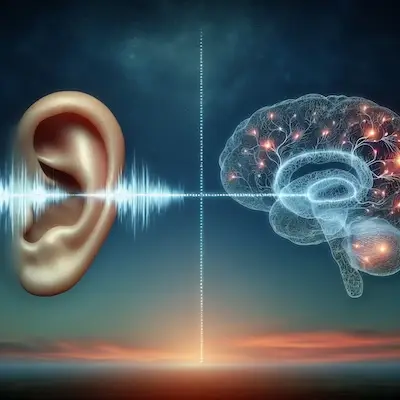
Unlocking Hope: An Overview of Effective Dementia Treatments
An overview of effective dementia treatments currently available.
Did you know that hearing loss could be linked to an increased risk of dementia? This connection between the two conditions has been explored in recent scientific studies, shedding light on the importance of managing hearing loss for overall brain health.
Research has shown that individuals with hearing loss are more likely to experience cognitive decline and develop dementia later in life. This correlation highlights the need for early detection and treatment of hearing loss to potentially minimize the risk of cognitive decline.
In this article, we delve into the research behind the connection between hearing loss and dementia. We explore the possible mechanisms involved and discuss the implications of this link. Whether you are personally affected by hearing loss or know someone who is, this information will provide valuable insights into the importance of hearing health in relation to brain health.

Hearing loss is a common condition that affects millions of people worldwide, particularly as they age. It can range from mild to profound, and its causes can include age-related degeneration, exposure to loud noises, infections, and even certain medications. When someone experiences hearing loss, they may struggle to follow conversations, catch nuances in speech, or even detect environmental sounds. This diminished auditory ability can lead to feelings of isolation and frustration, as social interactions become increasingly challenging.
The prevalence of hearing loss is staggering; according to the World Health Organization, over 1.5 billion people globally experience some form of hearing impairment. This number is expected to rise dramatically due to factors such as aging populations and increased exposure to loud environments. The prevalence of hearing loss is higher among older than younger individuals, with more than 70% of adults aged 70 and older having hearing loss in at least one ear [1]. Hearing loss is not just a minor inconvenience; it can profoundly impact an individual’s quality of life. Many people with hearing loss find themselves withdrawing from social activities, leading to increased feelings of loneliness and depression.
Recent studies have begun to illuminate a concerning link between hearing loss and dementia. As researchers delve deeper into this association, it becomes evident that addressing hearing impairments could play a pivotal role in cognitive health.
Hearing loss does not merely affect auditory perception; it can significantly impact overall brain health. As the brain relies on auditory input to maintain neural connections and cognitive functioning, the absence of sound can lead to changes in brain structure and function. Neuroplasticity, the brain’s ability to adapt to new experiences and challenges, may be compromised when auditory stimuli are limited. This limitation can result in the loss of neural connections, further exacerbating cognitive decline (sensory deprivation hypothesis of the link between hearing loss and dementia).
Research has shown that the brain regions responsible for processing sound also play a critical role in language comprehension and memory. When these areas are deprived of stimulation due to hearing loss, it can lead to atrophy and reduced functionality. Consequently, the cognitive resources that would typically be devoted to higher-order processes may be redirected to compensate for the loss of auditory input, ultimately impacting memory and reasoning capabilities (cognitive load theory of the link between hearing loss and dementia) [2].
Moreover, studies indicate that individuals with hearing loss may be at a higher risk for developing neurodegenerative diseases due to reduced cognitive engagement. As brain health is closely linked to mental activity, the reduced stimulation from diminished hearing can contribute to cognitive decline and increase the likelihood of developing conditions like Alzheimer’s disease. Recognizing the complex relationship between hearing loss and brain health is crucial for understanding how best to support cognitive functioning as we age.

Approximately 23 million adults with hearing loss in the United States do not use hearing aids even though the negative impact of untreated hearing loss has been widely documented. The low level of hearing aid adoption is associated with stigma and affordability of hearing aids [3].
As already stated, hearing loss has been associated with increased risk of incident dementia [4]. Also, adults with impaired hearing, who do not wear hearing aids, demonstrate significantly higher rates of depression, anxiety, and other psychosocial disorders [5].
Managing hearing loss effectively is crucial in reducing the risk of cognitive decline. One of the most significant steps individuals can take is to undergo regular hearing assessments, especially as they age. Early detection of hearing impairments allows for timely intervention, which can significantly improve communication abilities and overall quality of life. Regular check-ups can identify changes in hearing and facilitate appropriate treatments, such as hearing aids or other assistive devices.
In addition to formal assessments, individuals should be proactive about protecting their hearing health. This includes avoiding prolonged exposure to loud noises, using ear protection in noisy environments, and engaging in hearing-friendly practices. For instance, turning down the volume on personal audio devices and being mindful of the acoustics in various settings can help preserve hearing capabilities.
Furthermore, cognitive engagement is vital for maintaining brain health. After correcting hearing, fostering connections with others and participating in stimulating conversations can help counteract the cognitive decline associated with hearing impairments. Cognitive stimulation therapy can help stimulate the brain and improve cognition while enjoying social engagement. Together, these strategies can create a holistic approach to managing hearing loss and promoting overall brain health.
Hearing aids have been a game-changer for many individuals experiencing hearing loss. In a review published in 2023 analyzing 31 studies comprising 137 484 participants, the use of hearing aids and cochlear implants in participants with hearing loss was found to be significantly associated with a 19% reduction in subsequent cognitive decline, compared with their counterparts with uncorrected hearing loss. This benefit was evident both for people with normal cognition and those with mild cognitive impairment. Furthermore, the use of these devices was significantly associated with a 3% improvement in cognitive test scores assessing general cognition. Correcting for hearing deficit is associated with a slower decline in cognition [6].
Hearing aids amplify sound, making it easier to engage in conversations and enjoy social interactions. By facilitating better communication, hearing aids help reduce feelings of isolation, thereby promoting social engagement and mental stimulation.
They also help maintain neural connections within the brain. When auditory input is restored, the associated brain regions remain active, allowing for continued cognitive engagement. This stimulation can counteract the atrophy that often occurs in response to untreated hearing loss, potentially lowering the risk of cognitive decline and dementia.
Moreover, the psychological benefits of using hearing aids cannot be overlooked. Many individuals report increased confidence and improved emotional well-being after receiving hearing aids. By reconnecting with their social circles and participating in conversations, they experience a renewed sense of belonging and purpose, further enhancing their overall mental health. Thus, hearing aids serve as a vital tool in the effort to combat cognitive decline and promote a healthier brain.

Maintaining brain health is a multifaceted endeavor that goes beyond managing hearing loss. Several lifestyle choices can contribute to cognitive resilience and reduce the risk of dementia. First and foremost, engaging in regular physical activity is essential. Exercise not only supports cardiovascular health but also promotes blood flow to the brain, which is crucial for cognitive functioning. Aim for at least 150 minutes of moderate aerobic activity weekly, along with strength training exercises.
In addition to physical activity, a balanced diet rich in nutrients is vital for brain health. Diets such as the Mediterranean or DASH (Dietary Approaches to Stop Hypertension) have been linked to cognitive benefits. These diets emphasize fruits, vegetables, whole grains, lean proteins, and healthy fats, which can help reduce inflammation and support overall brain function. Staying hydrated is equally important, as dehydration can negatively impact cognitive abilities.
Mental engagement is another critical aspect of maintaining brain health. Activities that challenge the brain, such as puzzles, reading, and learning new skills, can help enhance cognitive function. Social interactions also play a significant role; engaging with friends and family, participating in community activities, or even volunteering can provide the mental stimulation necessary for cognitive health. By incorporating these practices into daily life, individuals can actively work towards reducing their dementia risk while enhancing their overall well-being.

Early detection and treatment of hearing loss are important for preserving cognitive health. The earlier individuals address their hearing impairments, the more likely they are to avoid the associated cognitive decline [7]. Regular hearing screenings can identify issues even before noticeable symptoms arise, allowing for timely intervention. These screenings should be part of routine healthcare, especially for older adults who are at a higher risk for hearing loss.
Once hearing loss is detected, prompt treatment options should be explored. Hearing aids, cochlear implants, and other assistive devices can significantly improve auditory perception and enhance communication abilities. Additionally, auditory rehabilitation programs can provide essential skills and strategies for adapting to hearing loss, further empowering individuals to engage in their social and cognitive environments.
Although the causal link between hearing loss and dementia is still being worked out, hearing health and cognitive function are inextricably tied. As research continues to unveil the complex relationship between these two conditions, it is essential for individuals to take proactive measures in managing their hearing health. Regular screenings, prompt treatment, and lifestyle modifications can all contribute to reducing the risk of cognitive decline.

An overview of effective dementia treatments currently available.

The underlying genetics of Alzheimer’s disease, explained simply.

Exercise is a powerful tool against dementia prevention.
Learn about Cognitive Health